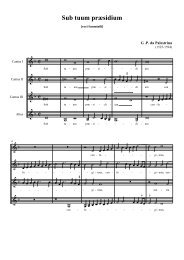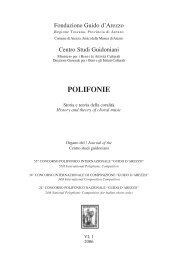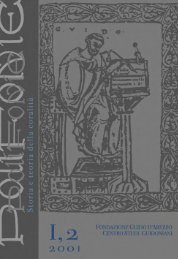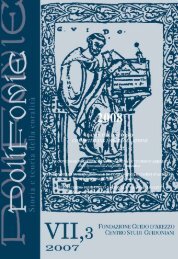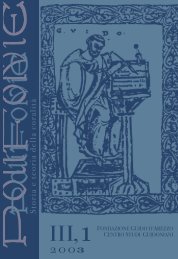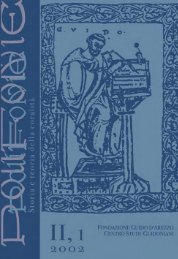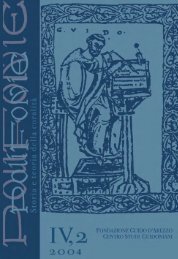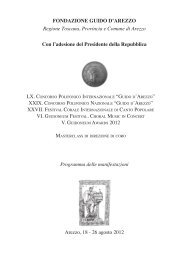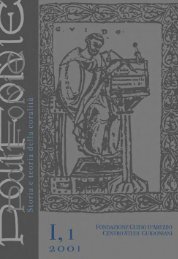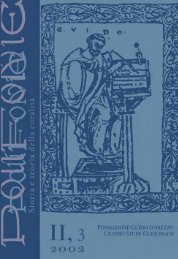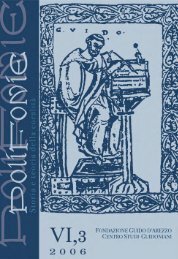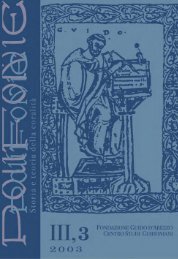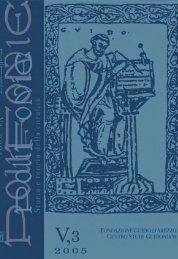Riviste Polifonie/119_2005 n 2.pdf - Fondazione Guido d'Arezzo
Riviste Polifonie/119_2005 n 2.pdf - Fondazione Guido d'Arezzo
Riviste Polifonie/119_2005 n 2.pdf - Fondazione Guido d'Arezzo
You also want an ePaper? Increase the reach of your titles
YUMPU automatically turns print PDFs into web optimized ePapers that Google loves.
RODOBALDO TIBALDI<br />
The motets of Orazio Vecchi: an anthology<br />
When one comes across the name Orazio Vecchi, one’s thoughts inevitably<br />
run to his secular music: the Selva di varia ricreatione (1590), Il convito<br />
musicale (1597), Le veglie di Siena (1604) and above all L’Amfiparnaso<br />
(1597). And for a good reason too, given their influence and the role they played<br />
in defining the madrigale rappresentativo (madrigal comedy) of the late<br />
16th and early 17th centuries. The large modern bibliography is further evidence<br />
of their importance, even though new editions are perhaps needed. Also<br />
fairly familiar is the ‘light’ repertoire of the canzonette, thanks to the research<br />
and to the editions of Ruth DeFord, Rossana Dalmonte and Massimo Privitera.<br />
1 And yet, by his own training and for a large part of his professional career,<br />
Vecchi was essentially a church musician. He was responsible for the musical<br />
chapels of Salò and above all Modena and, though certainly not prolific, he<br />
was a composer involved in various genres of sacred music. Furthermore, as<br />
is well known, in 1590 he was called upon to help revise the Roman Gradual,<br />
a task already begun by Andrea Gabrieli (who died in 1585) and Lodovico<br />
Balbi. This volume was published in Venice by Gardano the next year. In spite<br />
of this, still today Vecchi’s sacred output tends to be put in the background or<br />
even neglected; and this particularly applies to the collections of polyphonic<br />
music. While specific research on the 1591 Gradual has recently been published,<br />
2 the bibliography on his sacred music is still substantially restricted to<br />
1<br />
See ORAZIO VECCHI, The Four-Voice Canzonettas with Original Texts and Contrafacta by Valentin<br />
Haussmann and Others, ed. by Ruth I. DeFord, Madison, A-R Editions, 1993 (Recent Researches<br />
in the Music of the Renaissance, 92-93); ROSSANA DALMONTE - MASSIMO PRIVITERA, Gitene,<br />
canzonette. Studio e trascrizione delle Canzonette a sei voci d’Horatio Vecchi (1587), Florence,<br />
Olschki, 1996.<br />
2<br />
See MARCO GOZZI, “Il Graduale di Angelo Gardano (1591)”, in Un museo nel Castello del<br />
Buonconsiglio. Acquisizioni, contributi, restauri, ed. by Laura Dal Prà, Trento, Provincia Autonoma<br />
di Trento - Castello del Buonconsiglio, 1995, pp. 399-414; THEODORE KARP, On the<br />
transimission of some mass chants, c. 1575-1775, in Il canto piano nell'era della stampa, atti<br />
del Convegno internazionale di studi sul canto liturgico nei secoli XV-XVIII (Trento, Castello<br />
del Buonconsiglio - Venezia, <strong>Fondazione</strong> Ugo e Olga Levi, 9-11 ottobre 1998), ed. by Giulio<br />
Cattin, Danilo Curti e Marco Gozzi, Trento, Provincia Autonoma di Trento. Servizio Beni<br />
Librari e Archivistici, 1999, pp. 81-97; ANNARITA INDINO, “Il Graduale stampato da Angelo<br />
Gardano (1591)”, in Ibidem, pp. 207-221.<br />
<strong>119</strong>



